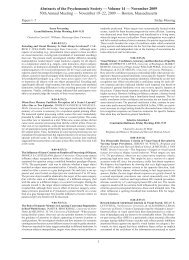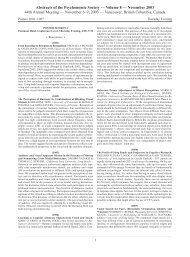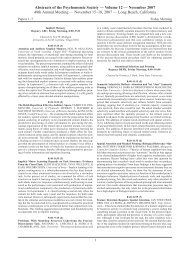Abstracts 2005 - The Psychonomic Society
Abstracts 2005 - The Psychonomic Society
Abstracts 2005 - The Psychonomic Society
You also want an ePaper? Increase the reach of your titles
YUMPU automatically turns print PDFs into web optimized ePapers that Google loves.
Posters 4030–4036 Saturday Noon<br />
cluded the specific cue (e.g., “Was there something you were supposed<br />
to do at 10:00?”). We found that participants using the implementation<br />
intentions strategy performed no differently than controls.<br />
Of the correct actions participants gave during prompting, 31% were<br />
in response to the nonspecific prompt. Participants gave the correct<br />
action on 86% of trials when they had remembered to act, but on only<br />
32% of trials when they were prompted, evidence supporting the nonindependence<br />
of the prospective and retrospective components.<br />
(4030)<br />
Evidence for Spontaneous Retrieval Processes in Prospective<br />
Memory. GILLES O. EINSTEIN, Furman University, MARK A.<br />
MCDANIEL, Washington University, & MATT LARSON, MATT<br />
MCDERMOTT, & LEAH RUSINKO, Furman University—According<br />
to the multiprocess theory (McDaniel & Einstein, 2000), prospective<br />
memory retrieval can be accomplished by controlled monitoring for<br />
target events or by reflexive processes that spontaneously respond to<br />
the presence of target events. <strong>The</strong> purpose of this research was to test<br />
for the existence of spontaneous retrieval processes. In the first experiment,<br />
we discouraged monitoring by heavily emphasizing the<br />
speed of performing the ongoing task. Despite no significant costs of<br />
performing a prospective memory task on the ongoing task being<br />
found, prospective memory performance was high. In the second experiment,<br />
participants were given the prospective memory task of<br />
pressing a key whenever either of two target events occurred. <strong>The</strong>y<br />
were then told to suspend this intention during an intervening task.<br />
Slowed responding to target items appearing in the intervening task<br />
suggested spontaneous retrieval. Taken together, these experiments<br />
provide evidence for the existence of spontaneous retrieval processes<br />
in prospective remembering.<br />
(4031)<br />
Monitoring in Event-Based Prospective Memory: Retrieval Mode<br />
Instantiation Plus Target Event Checks. MELISSA J. GUYNN, New<br />
Mexico State University—Prospective memory can be mediated by<br />
monitoring for the targets that indicate when it is appropriate to execute<br />
the intended action. A dual-process theory proposes that monitoring<br />
entails instantiating a retrieval mode plus checking for the targets.<br />
Two experiments provide evidence for these processes. Monitoring<br />
was indexed by impairment on nontarget trials of a reaction time task.<br />
Greater impairment on experimental trials (i.e., there was a goal to execute<br />
an intention) when a target could appear in five locations than<br />
when a target could appear in one location provided evidence for target<br />
checking. Greater impairment on control trials (i.e., there was not<br />
a goal to execute an intention) when participants had been instructed<br />
about the prospective memory task than when participants had not<br />
been so instructed, and the fact that performance on control trials was<br />
not affected by the one-location versus five-location instruction, provided<br />
evidence for instantiating a retrieval mode.<br />
(4032)<br />
Implementation Intentions and Prospective Memory. REBEKAH E.<br />
SMITH, University of North Carolina, Chapel Hill, & MELISSA D.<br />
MCCONNELL & JENNIFER C. LITTLE, University of North Carolina,<br />
Greensboro—Prospective memory involves remembering to perform<br />
an action in the future, such as remembering to stop at the store on the<br />
way home from work. Chasteen, Park, and Schwarz (2001) found that<br />
prospective memory performance could be improved with implementation<br />
intention instructions (Gollwitzer, 1999). <strong>The</strong> present study<br />
uses a multinomial model (Smith & Bayen, 2004) to investigate how<br />
implementation intention instructions affect the underlying cognitive<br />
processes that determine successful prospective memory performance.<br />
(4033)<br />
Prospective Memory, Instructions, and Personality. JIE GAO, CAR-<br />
RIE CUTTLER, & PETER GRAF, University of British Columbia<br />
(sponsored by Jonathan W. Schooler)—<strong>The</strong> main goal of the present<br />
study was to explore whether informing participants that prospective<br />
110<br />
memory (ProM) tasks have been assigned as an assessment of their<br />
memory influences subsequent ProM performance. Subjects were<br />
randomly assigned to two conditions; one was an informed condition,<br />
in which subjects were told that the ProM tasks had been assigned to<br />
assess their memory, and the other was a naive condition, in which<br />
subjects were not informed that the ProM tasks had been assigned to<br />
assess their memory. Subjects in the Informed condition performed<br />
better on one ProM task. Follow-up analyses explored whether the<br />
personality types that best predicted ProM performance varied across<br />
the instructional conditions. <strong>The</strong> results showed that neuroticism and<br />
conscientiousness predicted ProM performance in the naive condition,<br />
whereas neuroticism, extraversion, and self-oriented perfectionism<br />
predicted ProM performance in the informed condition.<br />
(4034)<br />
Obsessive-Compulsive Checking and Prospective Memory. CARRIE<br />
CUTTLER & PETER GRAF, University of British Columbia (sponsored<br />
by Peter Graf)—We explored whether individuals high in obsessivecompulsive<br />
checking (high checkers) have objective and/or subjective<br />
impairments in their prospective memory (ProM)—their ability to remember<br />
to do things at a later time. Forty-two high checkers and 42<br />
low checkers completed the Prospective Memory Questionnaire and<br />
the Prospective and Retrospective Memory Questionnaire—each of<br />
which assesses the perceived frequency of a variety of ProM failures.<br />
<strong>The</strong>y were also assigned one event-cued ProM task, which required<br />
requesting the return of a personal belonging (e.g., a watch) at the end<br />
of the session, and one time-cued ProM task, which required reminding<br />
the experimenter to make a phone call in exactly 30 min. High<br />
checkers reported significantly more ProM failures on the questionnaires<br />
and performed significantly worse on the event-cued, but not<br />
time-cued, ProM task. We suggest that checking is a compensatory<br />
strategy for dealing with impairments in ProM task performance.<br />
• MEMORY PROCESSES •<br />
(4035)<br />
<strong>The</strong> Role of Basic-Level Convergence in Accounting for the Misinformation<br />
Effect. AINAT PANSKY & SARAH K. BAR, University<br />
of Haifa—Recent findings have shown that information reported from<br />
memory tends to converge at an intermediate level of abstractness—<br />
the basic level—particularly over time (Pansky & Koriat, 2004). In the<br />
present study, these findings were applied to the rich body of research<br />
investigating the misinformation effect. Assuming gradual basic-level<br />
convergence, a misinformation effect was expected when the misleading<br />
information was delayed and consistent with the basic level of the<br />
original information, but not when it was inconsistent. <strong>The</strong> findings<br />
from three experiments confirmed the hypotheses. Memory for the<br />
original information was impaired when the misleading information<br />
belonged to the same basic-level category, but not when it belonged<br />
to a different basic-level category, although similarity to the original<br />
information was equated for the two types of misleading information.<br />
<strong>The</strong> findings support the view of the misinformation effect as a byproduct<br />
of spontaneous memory processes that occur over time.<br />
(4036)<br />
Source Monitoring and Interrogative Suggestibility. SERENA<br />
MASTROBERARDINO & FRANCESCO S. MARUCCI, University of<br />
Rome La Sapienza, & DAVID C. RICCIO & MARIA S. ZARAGOZA,<br />
Kent State University—<strong>The</strong> Gudjonsson Suggestibility Scale 2 (GSS2;<br />
Gudjonsson, 1984) is a well-studied and widely used measure of individual<br />
differences in interrogative suggestibility. Most previous research<br />
with the GSS2 has focused on the role of personality and social variables<br />
in interrogative suggestibility. <strong>The</strong> goal of the present study was<br />
to investigate whether individual differences in cognitive/memorial<br />
variables might also play a role in suggestibility, as measured by the<br />
GSS2. Specifically, this study assessed whether high-suggestible participants<br />
(as measured by the GSS2) would perform more poorly on an<br />
unrelated source-monitoring task involving perceptual overlap between





